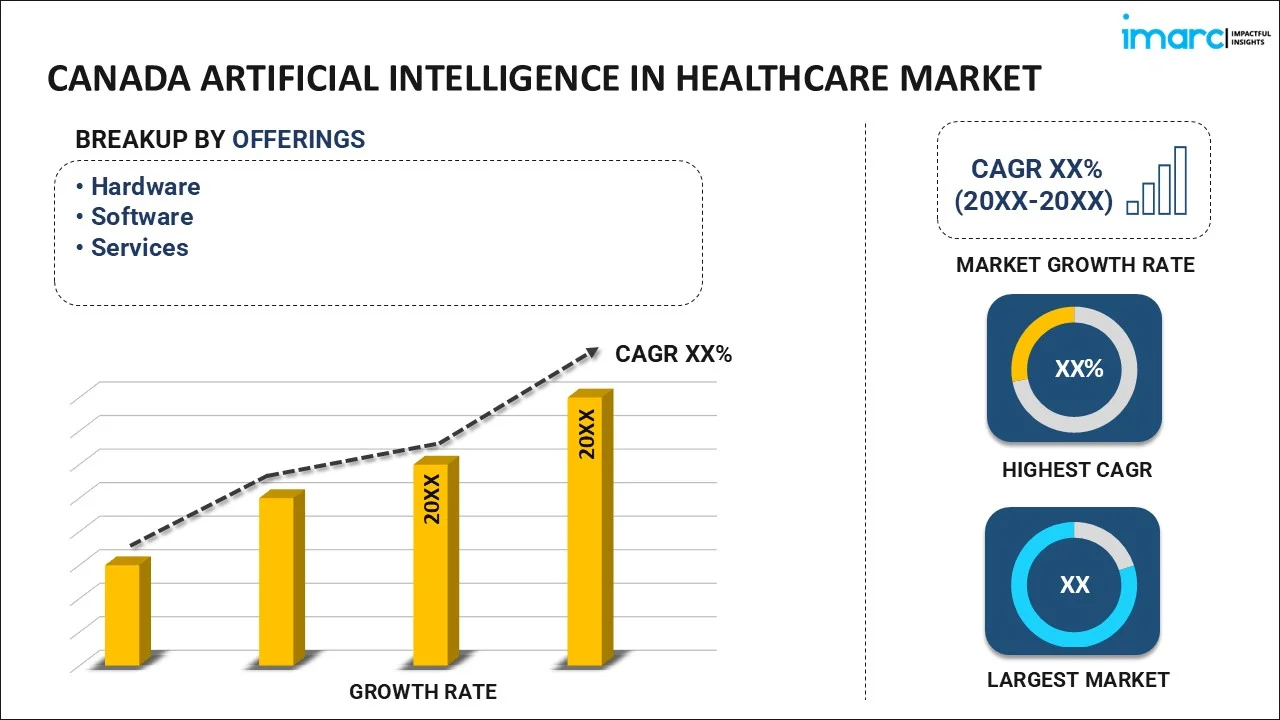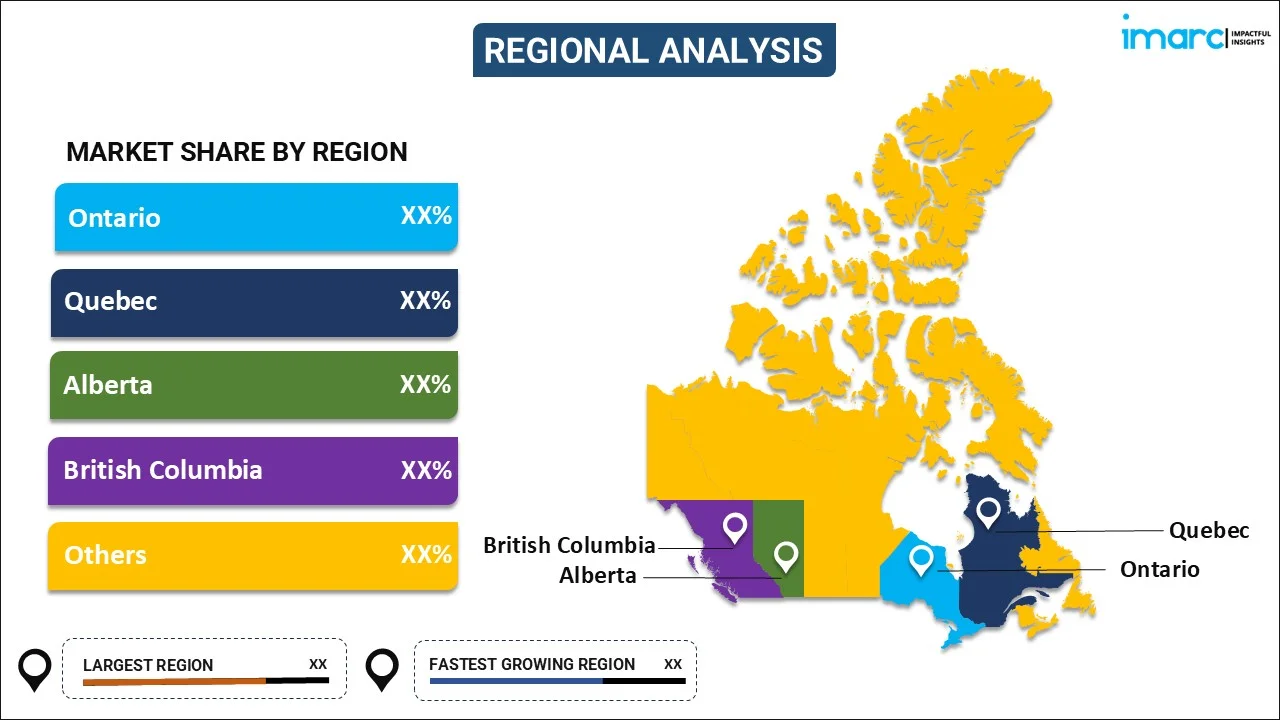
Canada Artificial Intelligence in Healthcare Market Size, Share, Trends and Forecast by Offering, Technology, Application, End User and Region, 2025-2033
Canada Artificial Intelligence in Healthcare Market Overview:
The Canada artificial intelligence in healthcare market size reached USD 163.80 Million in 2024. Looking forward, IMARC Group expects the market to reach USD 3,321.44 Million by 2033, exhibiting a growth rate (CAGR) of 36.81% during 2025-2033. The market is driven by the growing use of AI in medical imaging and diagnostics, rising demand for personalized medicine and treatment strategies, government initiatives and investments in AI healthcare solutions, and increased demand for effective healthcare management and predictive analytics.
|
Report Attribute
|
Key Statistics
|
|---|---|
|
Base Year
|
2024
|
|
Forecast Years
|
2025-2033
|
|
Historical Years
|
2019-2024
|
| Market Size in 2024 | USD 163.80 Million |
| Market Forecast in 2033 | USD 3,321.44 Million |
| Market Growth Rate (2025-2033) | 36.81% |
Canada Artificial Intelligence in Healthcare Market Trends:
Increasing Demand for Personalized Medicine
The market for artificial intelligence in healthcare in Canada is mainly spurred by an increasing need for personalized medicine. Healthcare professionals and patients alike are shifting away from a one-size-fits-all treatment method. Rather, medical interventions that are suited to the genetic predispositions, lifestyle, and individualized health status of the patient are becoming popular. AI can take large amounts of patient data and use it to create customized treatment plans that are more efficient and effective. This includes genomic data, medical histories, and current health metrics. Furthermore, ML algorithms can examine data in order to find patterns that might not be easy to see to human clinicians. This can lead to more accurate diagnoses and treatment plans. As personalized medicine expands, AI is becoming increasingly important to the optimization of therapy and betterment of outcomes, further fueling the demand in Canada for healthcare solutions based on AI. For instance, Manulife announced in August 2023 that its personalized medicine service, which is commonly referred to as pharmacogenomics in the industry, will be free for Extended Health Care members who meet specific qualifying requirements. Using a saliva sample, this quick, one-time genetic test can estimate the potential effectiveness of specific medications based on a person's genetic composition in less than a minute. By using the information, medical professionals may create accurate and individualized treatment programs, which lowers side effects and improves patient outcomes.
Integration of AI in Wearable Health Technologies
A key impetus for the artificial intelligence (AI) in healthcare market in Canada is the embedding of AI in wearable health devices, including fitness trackers, smartwatches, and health monitors. In today's modern age of individualized health care, there is an increasing need to incorporate consumer health technology products to empower both clinicians and patients. As per the Canadian Journal of Cardiology, the widespread presence of wearable technology is evident, as approximately 15%-25% of Canadians, and over 25% of individuals in the United States own a device that tracks their fitness or health. These wearables harvest extensive data on physical activity, heart rate, sleep, and other vital signs. AI plays a crucial role in interpreting this data by providing users with individualized health reports and monitoring their overall wellness from a physical health aspect. Beyond that, AI-driven wearables are also used in remote patient monitoring to constantly monitor the patient's state of health when suffering from chronic conditions like cardiovascular or respiratory diseases. These AI-powered devices immediately notify a healthcare professional whenever there are abnormalities in the patient, allowing timely intervention before a straightforward medical problem turns life-threatening. With wearable technology constantly evolving, the incorporation of AI is increasing as well, painting a positive market scenario overall.
Growing Need for Efficient Healthcare Management
The growth in the demand for improved healthcare management is critical in driving the Canada artificial intelligence (AI) in healthcare market. In the 2023 Commonwealth Fund survey, Canada was ranked 7th out of 10 high-income nations, assessing the effectiveness of top health systems in five crucial areas: access to care, care processes, administrative efficiency, equity, and health outcomes. Healthcare systems in Canada are confronted by various challenges like escalating costs, a growing geriatric population, and constrained resources. AI solutions are becoming more and more employed to fight these challenges. Artificial intelligence systems have the ability to automate day-to-day office operations like appointment booking, billing, and claims handling, thus taking the load off healthcare professionals and enabling them to concentrate more on patient care. They also facilitate better resource allocation, automate routine administrative tasks, and optimize patient care coordination. This raises the level of the patient experience as well as enhances efficiency for healthcare professionals. With the Canadian healthcare system in pursuit of eradicating costs and resource shortages, the need for AI-enabled management solutions is increasing, paving the way for overall market growth.
Canada Artificial Intelligence in Healthcare Market Segmentation:
IMARC Group provides an analysis of the key trends in each segment of the market, along with forecasts at the regional level for 2025-2033. Our report has categorized the market based on offering, technology, application, end user and region.
Offering Insights:

- Hardware
- Software
- Services
The report has provided a detailed breakup and analysis of the market based on the offering. This includes hardware, software, and services.
Technology Insights:
- Machine Learning
- Context Aware Computing
- Natural Language Processing
- Others
The report has provided a detailed breakup and analysis of the market based on the technology. This includes machine learning, context aware computing, natural language processing, and others.
Application Insights:
- Robot-Assisted Surgery
- Virtual Nursing Assistant
- Administrative Workflow Assistance
- Fraud Detection
- Dosage Error Reduction
- Clinical Trial Participant Identifier
- Preliminary Diagnosis
- Others
The report has provided a detailed breakup and analysis of the market based on the application. This includes robot-assisted surgery, virtual nursing assistant, administrative workflow assistance, fraud detection, dosage error reduction, clinical trial participant identifier, preliminary diagnosis, and others.
End User Insights:
- Healthcare Providers
- Pharmaceutical and Biotechnology Companies
- Patients
- Others
The report has provided a detailed breakup and analysis of the market based on the end user. This includes healthcare providers, pharmaceutical and biotechnology companies, patients, and others.
Regional Insights:

- Ontario
- Quebec
- Alberta
- British Columbia
- Others
The report has also provided a comprehensive analysis of all the major regional markets, which include Ontario, Quebec, Alberta, British Columbia and Others.
Competitive Landscape:
The market research report has also provided a comprehensive analysis of the competitive landscape. Competitive analysis such as market structure, key player positioning, top winning strategies, competitive dashboard, and company evaluation quadrant has been covered in the report. Also, detailed profiles of all major companies have been provided.
Canada Artificial Intelligence in Healthcare Market News:
- 29 May 2024: The healthcare sector in Alberta, a province in Western Canada, has received a $9.5 Million grant to invest in the application of artificial intelligence (AI). The fundamental objective of the Alberta Innovates grant is to enhance medical diagnosis and treatment in the health sector using AI.
- 15 March 2024: The executive training initiative of the University of Waterloo, WatSPEED, has introduced a new AI project to transform healthcare in Canada. The program aims to provide executives and senior leaders with the tools and information required to efficiently utilize artificial intelligence (AI) to improve patient outcomes.
Canada Artificial Intelligence in Healthcare Market Report Coverage:
| Report Features | Details |
|---|---|
| Base Year of the Analysis | 2024 |
| Historical Period | 2019-2024 |
| Forecast Period | 2025-2033 |
| Units | Million USD |
| Scope of the Report |
Exploration of Historical Trends and Market Outlook, Industry Catalysts and Challenges, Segment-Wise Historical and Future Market Assessment:
|
| Offerings Covered | Hardware, Software, Services |
| Technologies Covered | Machine Learning, Context Aware Computing, Natural Language Processing, and Others |
| Applications Covered | Robot-Assisted Surgery, Virtual Nursing Assistant, Administrative Workflow Assistance, Fraud Detection, Dosage Error Reduction, Clinical Trial Participant Identifier, Preliminary Diagnosis, and Others |
| End Users Covered | Healthcare Providers, Pharmaceutical and Biotechnology Companies, Patients, and Others |
| Regions Covered | Ontario, Quebec, Alberta, British Columbia and Others. |
| Customization Scope | 10% Free Customization |
| Post-Sale Analyst Support | 10-12 Weeks |
| Delivery Format | PDF and Excel through Email (We can also provide the editable version of the report in PPT/Word format on special request) |
Key Questions Answered in This Report:
- How has the Canada artificial intelligence in healthcare market performed so far and how will it perform in the coming years?
- What is the breakup of the Canada artificial intelligence in healthcare market on the basis of offering?
- What is the breakup of the Canada artificial intelligence in healthcare market on the basis of technology?
- What is the breakup of the Canada artificial intelligence in healthcare market on the basis of application?
- What is the breakup of the Canada artificial intelligence in healthcare market on the basis of end user?
- What is the breakup of the Canada artificial intelligence in healthcare market on the basis of region?
- What are the various stages in the value chain of the Canada artificial intelligence in healthcare market?
- What are the key driving factors and challenges in the Canada artificial intelligence in healthcare market?
- What is the structure of the Canada artificial intelligence in healthcare market and who are the key players?
- What is the degree of competition in the Canada artificial intelligence in healthcare market?
Key Benefits for Stakeholders:
- IMARC’s industry report offers a comprehensive quantitative analysis of various market segments, historical and current market trends, market forecasts, and dynamics of the Canada artificial intelligence in healthcare market from 2019-2033.
- The research report provides the latest information on the market drivers, challenges, and opportunities in the Canada artificial intelligence in healthcare market.
- Porter's five forces analysis assist stakeholders in assessing the impact of new entrants, competitive rivalry, supplier power, buyer power, and the threat of substitution. It helps stakeholders to analyze the level of competition within the Canada artificial intelligence in healthcare industry and its attractiveness.
- Competitive landscape allows stakeholders to understand their competitive environment and provides an insight into the current positions of key players in the market.
Need more help?
- Speak to our experienced analysts for insights on the current market scenarios.
- Include additional segments and countries to customize the report as per your requirement.
- Gain an unparalleled competitive advantage in your domain by understanding how to utilize the report and positively impacting your operations and revenue.
- For further assistance, please connect with our analysts.
 Request Customization
Request Customization
 Speak to an Analyst
Speak to an Analyst
 Request Brochure
Request Brochure
 Inquire Before Buying
Inquire Before Buying




.webp)




.webp)












